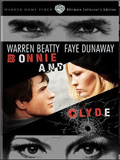
Note: This is #46 in my 52 Classic Movies in 52 Weeks challenge for 2009.
Here’s a pretty accurate plot summary of Bonnie and Clyde: Bonnie and Clyde fall in love, try to escape the Great Depression, commit violence, get famous, die in a hail of gunfire, leave beautiful corpses.
That’s pretty much it, but there’s a lot more if you look beyond the plot. Bonnie Parker (Faye Dunaway) is a bored Texan waitress who meets Clyde Barrow (Warren Beatty), an ex-convict fresh out of jail. Both are faced with a meaningless life in the grip of the Great Depression, so after introductions are made Clyde sweeps Bonnie into a life of bank robbers and other crimes, but she comes willingly since she sees it as a means of escape. The movie strikes this weird tone that straddles light hearted love story and violent crime drama as the two try to assume some populist Robin Hood stature in the eyes of sharecroppers and other folks made destitute by the Depression. Both clearly announce their identities at the beginning of each heist and even pose for pictures and send in bad poetry about their exploits to the newspapers. They even accumulate a posse in the form of a like-minded but none too bright gas station attendant C.W. Moss plus Clyde’s older brother Buck (Gene Hackman) and his harpy of a wife Blanche (Estelle Parsons).
The Barrow Gang, as they are called, achieve the notoriety they’re after, and even some amount of respect from the common man. But as the film progresses both the characters and the audience start to see them as doomed. “You best keep running,” says Bonnie’s mother in their final meeting. It’s fascinating to see how this group, which is tied together by circumstances of their own making, evolves and reacts to each other. Bonnie and Blanche hate each other, and everyone becomes frustrated by C.W. Moss for continually screwing up and putting them in danger. In a very existential fashion, they must all deal with their inevitable doom by making use of what time they have, and to their credit Bonnie and Clyde make a go of it. They enjoy a brief flash of happiness, escape, purpose, and love before they’re killed violently in a trap of their own slow making. Roll credits.
I also feel that there’s probably more going on with the cinematography and direction than I’m capable of appreciating, since the film really looks and feels different than anything else I’ve seen in this little experiment. But it’s something that seems just beyond my ability to recognize and appreciate. Still, it’s good enough just as a character drama.
Published by